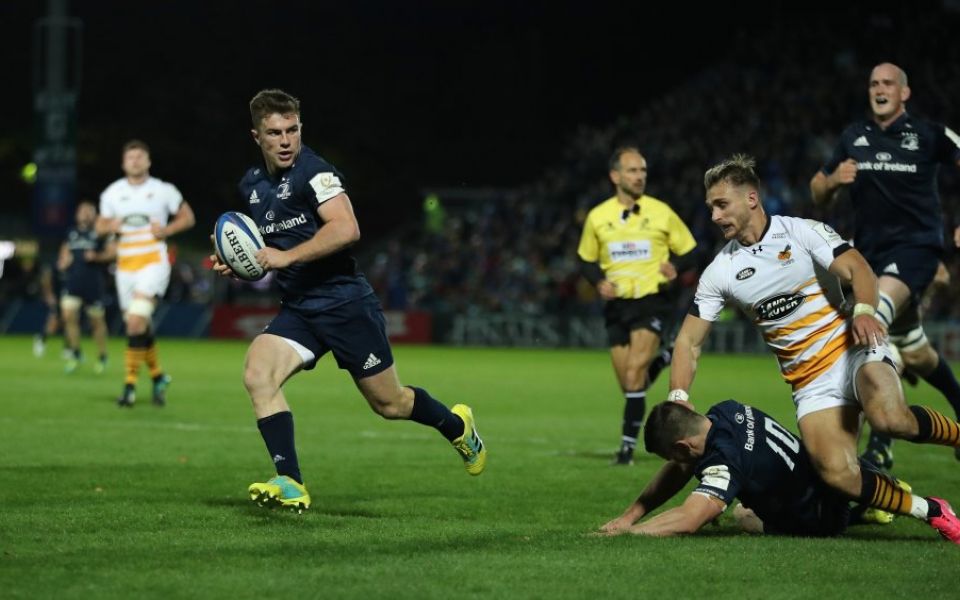Champions Cup: Have reports of English clubs’ struggles in Europe been greatly exaggerated?

Last season was not England’s best in European rugby. After Saracens’ dominant successive Champions Cup wins, the Premiership endured something of a coming back to earth moment in 2017-18.
While Saracens reached the quarter-finals for the sixth consecutive campaign, they were not joined by any of their domestic rivals.
Exeter Chiefs – 2016-17 Premiership champions and by far the closest competitor for Sarries – suffered three defeats and failed to get out of their group. Bath came up narrowly short of a best runner-up spot, while Northampton, Harlequins and Leicester managed a solitary win apiece to finish bottom of their respective pools.
Read more: Ollie Phillips: Leinster and Saracens favourites for Champions Cup glory
When Saracens were then beaten by eventual winners Leinster in the last eight, it meant no English representation in the semi-finals of Europe’s premier competition for only the fourth time in the last 21 years.
Was this underachievement indicative of a nationwide decline? After all, England has produced eight winners in 23 years since the competition, originally known as the Heineken Cup, was established in 1995.

Saracens won the Champions Cup in 2016 and 2017 (Source: Getty)
Those victories were shared out between five clubs – compared to France and Ireland’s three – indicating that historically England, while not the equal of France, has at least been competitive.
However, by early evening on Saturday all of these concerns seemed reasonable.
The Champions Cup kicked off with defending champions Leinster’s eight-try thrashing of Wasps on Friday night and it didn’t get much better on the following day for English sides.
Leicester, who are still trying to find their feet under Geordan Murphy, fell away in the second half to lose to Ulster; Freddie Burns’s humiliating mistake cost Bath dear in a narrow reverse at home to Toulouse; and Exeter battled a gale but could only draw with Munster at Sandy Park.
Four games, no wins, and Tigers interim head coach Murphy was quick to make a familiar point about the difference between the schedules of Premiership clubs and those from Ireland, Wales, Scotland, Italy and South Africa in the Pro14.

Munster held Exeter to a 10-10 draw at Sandy Park on Saturday in difficult conditions (Source: Getty)
“I’m constantly looking at the calendar, saying: ‘Where can I get people rest and get them a bit of down time just to recover their bodies?’”, he said. “It’s very difficult in the Premiership. I’d like to be coaching this side of the sea [in Ireland].”
Murphy’s gripe looked well-founded, with Ulster and Leinster winning and Munster taking a very creditable draw away to a side who have won all six of their Premiership fixtures so far.
Thankfully, for the sake of English pride, things turned around on Sunday. Gloucester edged past French champions Castres at Kingsholm, heavyweights Saracens won a bruising encounter away in Glasgow, while Newcastle saved the best until last with a one-point victory at Toulon.
The Falcons sit bottom of the Premiership, with just one win from six matches, but still had the mettle to come back from a 23-second try and defeat the three-time European champions on their own ground.
“There were a lot of lads out there who’ve never played Champions Cup rugby and they didn’t look out of place at all,” said Newcastle head coach Dean Richards.

Newcastle Falcons defied their poor start in the Premiership with a famous win over Toulon (Source: Getty)
The contrast of Newcastle’s struggles in the Premiership and triumph in Europe is fairly compelling evidence that English rugby’s problems are perhaps not as severe as first thought, and if you look at the Challenge Cup there is more.
Northampton were the only English team to lose in Europe’s second-tier competition at the weekend, going down to three-time Champions Cup runners-up Clermont, with Worcester and Sale winning away in France and newly-promoted Bristol and Harlequins victorious at home.
With only one round of the competition played it’s certainly too early to draw firm conclusions, but what evidence we do have suggests reports of English rugby’s struggles may have been greatly exaggerated.